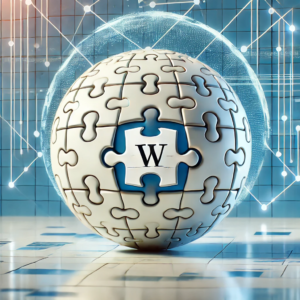Introduction

Wikipedia, the free online encyclopedia, has become an integral part of the digital landscape since its inception in 2001. Founded by Jimmy Wales and Larry Sanger, Wikipedia allows users worldwide to create, edit, and access articles on a vast array of topics, embodying the principles of open collaboration and shared knowledge.
The Birth and Growth of Wikipedia
Launched on January 15, 2001, Wikipedia started as a complementary project to Nupedia, an earlier online encyclopedia that featured expert-written articles. However, Wikipedia’s unique model of allowing non-expert contributions led to rapid growth, quickly surpassing Nupedia. Over the years, it has evolved into the largest and most-read reference work globally, boasting over 55 million articles in more than 300 languages as of 2024.
The Wikimedia Foundation
In 2003, the Wikimedia Foundation was established as a non-profit organization to oversee Wikipedia and its sister projects. Funded mainly by reader donations, the foundation ensures that Wikipedia remains a free and accessible resource for all.
Wikipedia’s Impact on Knowledge Sharing
Wikipedia’s open-source model has democratized information dissemination, allowing anyone with internet access to contribute to and benefit from a vast repository of knowledge. This approach has not only made information more accessible but has also fostered a global community of volunteer editors dedicated to maintaining and improving content quality.
Challenges and Controversies
Despite its success, Wikipedia has faced challenges, including concerns about content accuracy, vandalism, and systemic biases. The platform relies on community self-policing to address these issues, with trusted contributors granted administrative privileges to monitor and rectify problematic content.
Additionally, Wikipedia has encountered legal disputes in various countries. For instance, in March 2025, the Wikimedia Foundation appealed to India’s Supreme Court to quash a Delhi High Court order demanding the removal of a Wikipedia page related to its legal dispute with the Indian news agency, ANI. Wikimedia argued that such removal would stifle free speech and restrict access to knowledge.
The Future of Wikipedia
As technology advances, Wikipedia faces new challenges and opportunities. The rise of artificial intelligence and changing user behaviors necessitate adaptations to ensure the platform remains relevant. Engaging younger generations, such as Generation Z, is crucial for sustaining the volunteer editor base and keeping content up-to-date. Efforts are underway to make editing more user-friendly and to encourage diverse contributions, aiming to reflect a broader spectrum of human knowledge.
Conclusion
Wikipedia stands as a testament to the power of collective intelligence and open collaboration. Its journey from a small online project to a global knowledge hub underscores the potential of shared human endeavor in the digital age. As it navigates future challenges, the core principles of openness, neutrality, and community engagement will continue to guide its evolution.
Disclaimer: This article is for informational purposes only and does not constitute legal advice. For official details and updates, please consult the Wikimedia Foundation’s official communications.